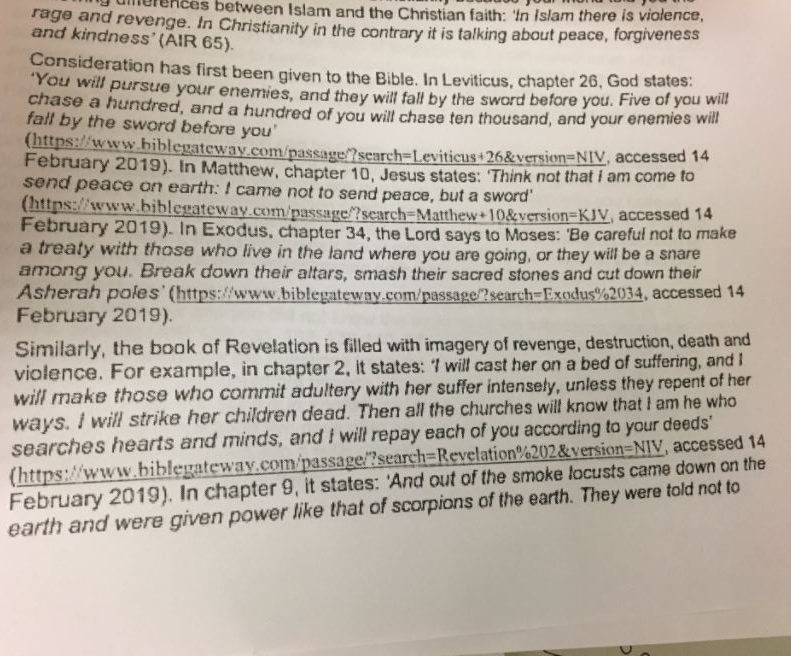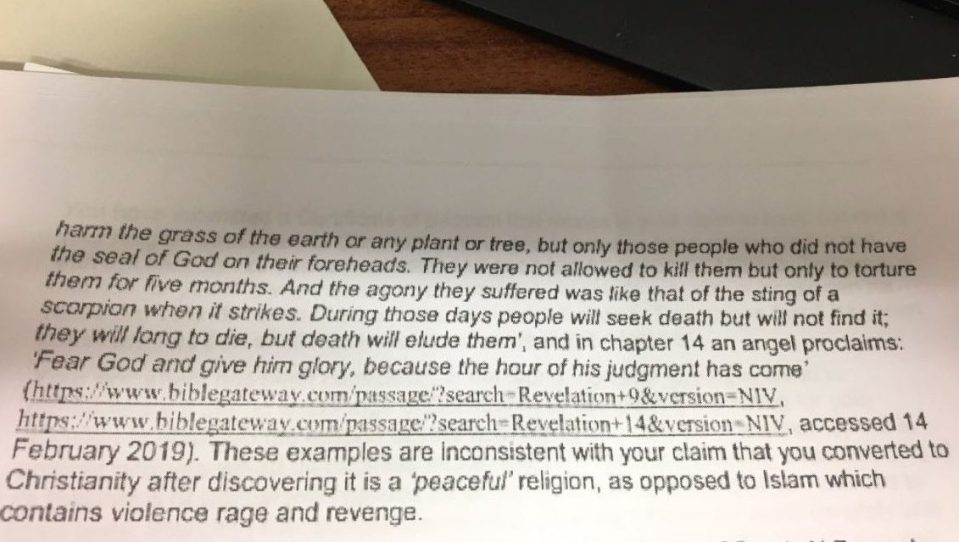The Independent reports (as do others) a story about a letter from the Home Office which quotes the Bible in order to counter claims about the validity of an Iranian asylum seeker’s conversion to Christianity. According to the report, the Home Office letter says the asylum seeker “converted to Christianity after discovering it is a ‘peaceful’ religion, as opposed to Islam which contains violence, rage and revenge.”
Only extracts from the letter have been put in the public domain—the full letter is not available for reasons of confidentiality. What is discussed in this blog post is only that which is publicly available and has been discussed publicly by the caseworker and in the press. Furthermore, what I want to look at here is the public presentation of ideas about violence, the Bible (including Revelation) and religion. In this instance, I am not going to suggest who has the correct interpretation (we lack the evidence to judge anyway) but rather look at the underlying assumptions implied in such interpretations.
Citing (with access dated) biblegateway.com, the Home Office letter uses passages (pictured below) from Leviticus 26.7-8, Matthew 10.34, Exodus 34.12-13, Revelation 2.22-23, 9.3-6, and 14.7 as part of a case to show inconsistency “with your claim that you converted to Christianity after discovering it is a ‘peaceful’ religion, as opposed to Islam which contains violence, rage and revenge,” and that “the book of Revelation is filled with imagery of revenge, destruction, death and violence.”


What is striking about this story is that its presentation of religion, Christianity and the Bible is the opposite to how they are presented in mainstream political and media discourse from Margaret Thatcher through to Theresa May, as well as other frontbench and prominent politicians, and even (to lesser extent) the mainstream press. The standard way to represent religion (including Islam) and the Bible in such settings is simple: that they are, at their core, about or support peace, tolerance, freedom, rule of law, and democracy. Moreover, when biblical passages are cited by Westminster-based politicians (which is not very often) they typically include acceptable sentiments such as “love thy neighbour”.
Passages about smashing idols or bringing the sword and punishment according to deeds, or even the citing the books of Leviticus and Revelation, are not (therefore) typical. The reason for this is that religion and the Bible are broadly understood as being compatible with parliamentary democracy and the liberal nation state, with anything deemed to be putatively too problematic for such values avoided, reinterpreted, or, when used by others, understood as a mis-representation of something purer. The Home Office official’s response, as it appears to be presented in this letter, is more akin to a new atheist-style understanding of religion. In other words, this looks like the usual official assumption about religion turned on its head.
The case of someone seeking asylum is, obviously, a crucial reason why this story has traction. And it is also because such a presentation of religion, Christianity and the Bible is not expected from the Home Office (as the report in the Independent suggests). That this happens under the surface is part of the surprise, as the following (online) headlines imply:
“Unbelievably offensive” Home Office letter quotes violent BIBLE verses to ‘prove’ Christianity is not peaceful as it rejects asylum bid by Iranian convert (Sun)
“Unbelievably offensive” Home Office letter quotes bloodthirsty bible verses to “prove” Christianity is NOT a religion of peace… (Mail Online)
Christianity NOT a religion of peace HOME OFFICE says citing bloodthirsty passages (Express)
Home Office quotes violent Bible verses to reject Christian's asylum claim (Mirror)
Reported establishment responses also agree with the headlines that something is wrong with this presentation of Christianity, religion and the Bible in an official setting. The Times (paywall) reports one response from a senior Church of England bishop, Paul Butler, the Bishop of Durham. Butler suggests that the government department is showing “a profound misunderstanding of the texts and practices of faith communities” and that “to use extracts from the book of Revelation to argue that Christianity is a violent religion is like arguing that a government report on the impact of climate change is advocating drought and flooding”. He goes further, arguing that the letter shows a “lack of religious literacy” that pervades the Home Office and those parts dealing with “a religious dimension” need “serious overhaul.” Put another way, this could be interpreted to mean that “religious literacy”, and how it should be enacted, would necessarily involve downplaying claims about any unacceptable language of violence associated with Revelation, the Bible, Christianity, and religion, and ensuring they are more acceptable for public consumption.
It should not be a surprise that such assumptions form the dominant narrative at play in this story. Nathan Stevens, the immigration caseworker for the asylum seeker, tweeted that he was “genuinely shocked to read this unbelievably offensive diatribe being used to justify a refusal of asylum”, adding “Whatever your views on faith, how can a government official arbitrarily pick bits out of a holy book and then use them to trash someone’s heartfelt reason for coming to a personal decision to follow another faith?” But Stevens also tweeted another example of a refusal letter from the Home Office: “You affirmed…that Jesus is your saviour, but then claimed that He would not be able to save you from the Iranian regime. It is therefore considered that you have no conviction in your faith and your belief in Jesus is half-hearted”.
What makes this example particularly out-of-place in the context of contemporary English political discourse is that it runs contrary to the usual implicit assumption that belief should involve a degree of ironic detachment—no-one is really supposed to believe that Jesus will directly save anyone from violence any more than a Bible-respecting politician would be expected proclaim too enthusiastically the merits of speaking in tongues or condemning sexual sins (ask Tim Farron). In what we might call the dominant “cultural Christianity” of English political discourse, such apparent oddities are best avoided, hence the assumption that someone being denied asylum for not really believing is understood as a perverse judgment to make and cannot be supported by the official narrative about how we are supposed to understand religion in the public-political domain.
Such assumptions about what government departments should and should not be doing with religion recur in various statements presented in the press. The Independent cites Sarah Teather, director of the Jesuit Refugee Service (and former Liberal Democrat MP), who is reported to have claimed that the story involves a “bizarre misquoting of the Bible”. Precisely what “misquoting” the Bible entails is not mentioned but presumably it is understood to include anything that presents the Bible in a problematically violent light. The Independent also mentions the legal expert and deputy editor of website Free Movement, Conor James McKinney, who is reported to have said that the Home Office writer was using “the Bible verses as a tool” to pick holes in the account of the conversion but (unlike the Bishop of Durham) added that this looked like a “particularly creative example” rather than “a systemic outbreak of anti-Christian sentiment in the department.” What is notable about this is not only the assumption that this was not normative practice but that such a focus on violence in the Bible is “anti-Christian sentiment”.
But even an alternative argument to Christianity-as-a-religion-of-peace works with similar assumptions. The Independent quotes Stephen Evans, chief executive of the National Secular Society who is reported to have said that it is “not the role of the Home Office to play theologian” and that assessment of asylum is not based “on the state’s interpretation of any given religion”. Certainly, the assumption about the relevance of religion in this letter is different from the usual way it is presented. There is no claim that the letter is necessarily anti-Christian but, as we might expect, the emphasis is that religion or theology should have no part to play. Where the shared assumptions come in is in the public presentation of the constituencies each participant effectively endorses. Teather and Evans both agree that what they endorse (whether Christianity or secularism) is compatible with liberal democracy (e.g., rule of law, tolerance, freedom, etc.) and not with its assumed opposite (e.g., terror, violent subjects, etc).
Whether any of these assumptions about religion and the Bible are right or wrong, they certainly belong to a long history of stereotypes about religion in relation to politics. The rejection of the language of violent religion, along with irrationality, illiberalism, apocalypticism, cults, fundamentalism, etc., can be used to bolster the boundaries of ideological acceptability, exclude challenges from left and right, and maintain political consensus in parliamentary democracy. This may sometimes seem like another parliamentary or academic game, but this language can be used for graver issues, whether justifying (as David Cameron did) the need to go to war in a country where a deviation of religion had been understood to have run wild—or judging whether someone is worthy of asylum in a liberal democracy.


